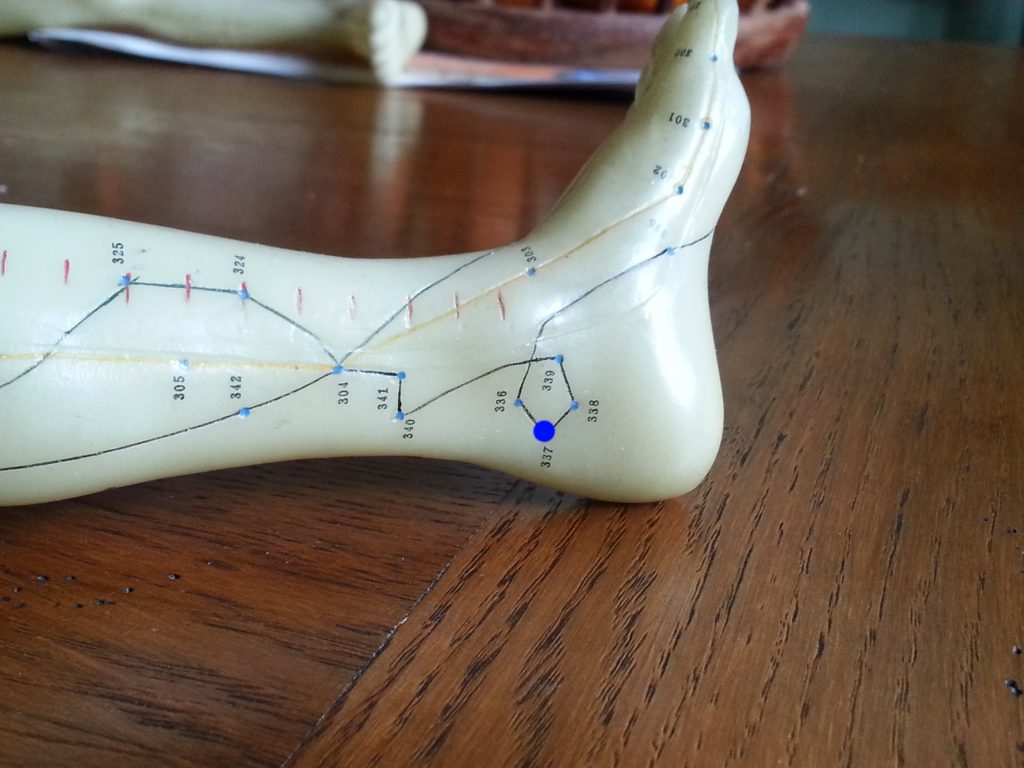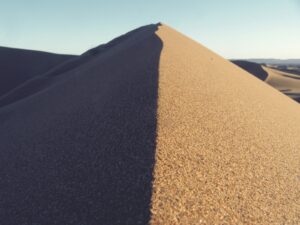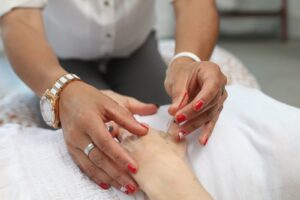Subscribe to the Newsletter
If you are interested in understanding how Traditional Chinese Medicine can improve your life sign up to my newsletter for the latest updates.

Kidney 4, Dazhong, Great Bell, is the fourth point on the Kidney acupuncture channel. In Chinese medicine it is the Kidney’s luo-connecting (or ‘junction’) point. It supports the Kidney function in a number of ways.
There is an alternative location, 0.5 cun distal to the point described above, which puts the point 0.5 cun posterior to Kidney 5.
As with locating any point, the description of where it is here or in books is a starting point. Palpation alone will locate the point exactly. Sometimes even palpation doesn’t solve the problem: only by needling will you discover the exact location.
Direct the needle anteriorly, almost as if towards the tip of the lateral malleolus bone. Up to 0.25 cun.
Local or downwards along the inside of the heel.
Moxibustion: up to 3x.
Because this is the Luo-connecting point of the Kidneys it has an effect not so much on Kidney Yin or Kidney Yang as on the direct relationship between the actions of the Kidneys and of both the Lungs and the Heart.
Lungs and Heart are in the upper ‘burning’ space, ie the chest.
The Kidneys are in the lower ‘burning space’, ie below the umbilicus. (In actual fact, their physical location is a bit higher than this, but in Chinese medicine they are perceived as acting in and on the lower abdomen.)

Chinese medicine sees the Kidneys as providing a stable anchor for the Heart and Lungs. (In turn, the Lungs and Heart can lift the Kidneys and provide inspiration and direction in life.)
Taking the Lungs and the Kidney first, when you breathe, the Qi you inhale is directed downwards.
As the ‘Qi’ is directed downwards, in a healthy person the Kidneys are said to ‘grab’ or anchor it. When the Kidneys fail to do this, you can’t catch your breath, or you find yourself trying to take ever deeper breaths.
This can be quite alarming! This is the situation with asthma sufferers with Kidney deficiency. At one time, this was thought to have contributed to what became known as a ‘barrel chest’.
This can also be the situation with coughs and wheezing, shortness of breath from Kidney deficiency.
You may also get this in a lesser form when, perhaps tired, you find yourself sighing or yawning repeatedly. However, sighing from emotional strain is something else, usually described by Qi Stagnation.
A more extreme form of this imbalance between Kidney and Lungs occurs when the Kidney Yin cannot nourish the Lungs properly because the Kidneys cannot send up a fine moisturising spray.
Then you get dryness in the throat and mouth, a dry cough, and sensitivity to dry or hot air. This may eventually lead to Heat in the Lungs, causing coughing up of blood.
NB There are other kinds of asthma, when the Kidneys are not deficient but, for example, the Lungs are said to be ‘full or in excess‘. Kidney 4 also helps this.
All the luo-connecting points do more than just reach to the related organ, in this case the kidneys. They also affect the emotions.
The emotion associated with the Kidneys is fear.
We are not talking about worry and anxiety here, unless extreme and prolonged. Worry and anxiety tend to affect the Spleen and Stomach first, although as they continue they affect also the Heart and eventually the Kidneys.
Without healthy Kidneys, there is a lack of confidence at the core of the individual. (But read Gallbladder for another aspect of this subject.) The individual quakes at his centre: he is a fearful person. Such a person fears to face the world, hence the desire to ‘close the door and stay at home’.
The Kidneys are also strongly associated with the spinal chord and the brain. Indeed, the chord and brain are seen as being an extension of the Kidneys. So when the Kidneys are deficient, there may be mental weakness or nervous system problems.
As age or continued infirmity dissipate the body’s resources, its Mingmen depletes, and problems may appear such as
Kidney 4 is often chosen as a main or strongly supporting point for syndromes causing these conditions.

Stay in Touch!
No spam, only notifications about new articles and updates.

Book a Video consultation if you want to know more about your symptoms

This Introductory Chinese medicine course introduces you to the amazing thinking behind this ancient medicine, now increasingly in demand.

The Scottish College for Chinese medicine provides introductory courses for all, explaining Chinese medicine and its cultural background.

Master Tung’s acupuncture is a hidden treasure, lost to China but recovered in Taiwan from where it spread round the world.

Knee pain has five main causes. It’s certainly worth trying acupuncture before you resort to surgery!
Subscribe to the Newsletter
If you are interested in understanding how Traditional Chinese Medicine can improve your life sign up to my newsletter for the latest updates.
Subscribe to the Newsletter
If you are interested in understanding how Traditional Chinese Medicine can improve your life sign up to my newsletter for the latest updates.